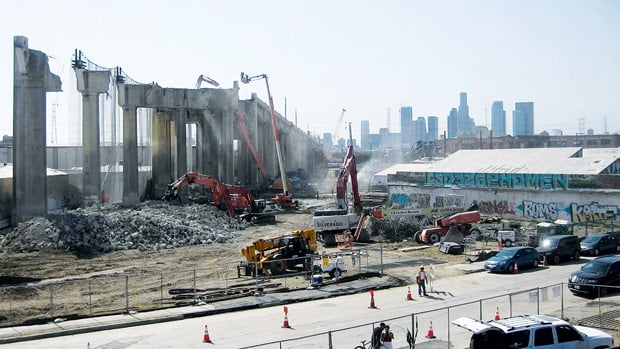A surge in public works construction projects led a strong year for companies that contract with the city of Los Angeles, according to the Business Journal’s annual list of city contractors.
Companies whose primary business is construction saw a 23 percent jump to $160 million in receipts from city contracts for fiscal year 2016-17, ending this past June.
A total of $728 million was paid to the 25 largest city contractors, up nearly 6 percent from the prior year.
The list is based on payments to contractors over the course of the city’s last fiscal year, ended June 30, but does not rank the values of individual contracts. Projects and dollars paid out for city contracts often extend over many years.
A single construction project – a joint venture between New York-based Skanska USA and Stacy and Witbeck Inc. of Alameda – accounted for an increase that equaled the combined gain for the entire list this year.
The two companies are building the $300 million-plus replacement bridge for Sixth Street, which will cross the Los Angeles River between downtown and Boyle Heights. The joint venture received $48.5 million from the city during the recent fiscal year, up from $14 million.
Mike Aparicio, executive vice president at Skanska and the company’s top local executive in Los Angeles, attributed to the jump in dollars to beginning work in earnest on the project, including a start on the demolition of the 85-year-old bridge.
“This has definitely been one of the most unique and challenging projects for us,” Aparicio said. “The demolition required great care and finesse because the demolition occurred next to existing Arts District buildings.”
The bulk of the work lies ahead, he added, calling it “a new legacy project.”
Overall, Aparicio said, this is the best environment he has seen in several years for contract work with the city of Los Angeles.
City officials attribute increased dollars to the strong local economy.
“The economy has improved and there is more funding available to public works to address our aging infrastructure challenges,” said Elena Stern, spokeswoman for the city’s Department of Public Works, which oversees most of the infrastructure construction projects.
The significant bump up in contract dollars is only part of the money picture, and does not include contracts at three large city agencies – the Los Angeles Department of Water & Power, Los Angeles World Airports and the Port of Los Angeles – each of which have major ongoing infrastructure projects. LAWA’s Los Angeles International Airport, for example, is amid a series of projects totaling $14 billion. Those agencies are considered “proprietary departments” that have their own sources of funding – such as user fees and leases – and generally spend money on their own operations.
Health insurance providers for city employees claimed the top two spots –and the lion’s share of overall revenue – on the list.
Combined city spending on Oakland-based Kaiser Permanente and Woodland Hills-based Anthem Blue Cross accounted for more than a third of the total for the listed companies. Top-ranked Kaiser’s share grew to $176 million from $150 million the year prior, while No. 2 Anthem plummeted to $75 million from $111 million.
No. 11 San Francisco-based Delta Dental of California’s contract with the city rose to $23.4 million in the 2016-17 fiscal year from $17.8 million for the previous fiscal year.
Rush Truck Center of New Brunfels, Texas, which supplies waste hauling trucks and parts and servicing to the city, doubled its revenue from the city compared with last year to $32 million, moving the company into the No. 5 slot from No. 20 last year.
Stern, of the city’s Public Works department, said the city’s Bureau of Sanitation placed an order during the past fiscal year for 70 new refuse collection trucks for single-family residential pickups with near-zero emission natural gas engines, but did not disclose if those accounted for Rush Truck’s increased gains.

